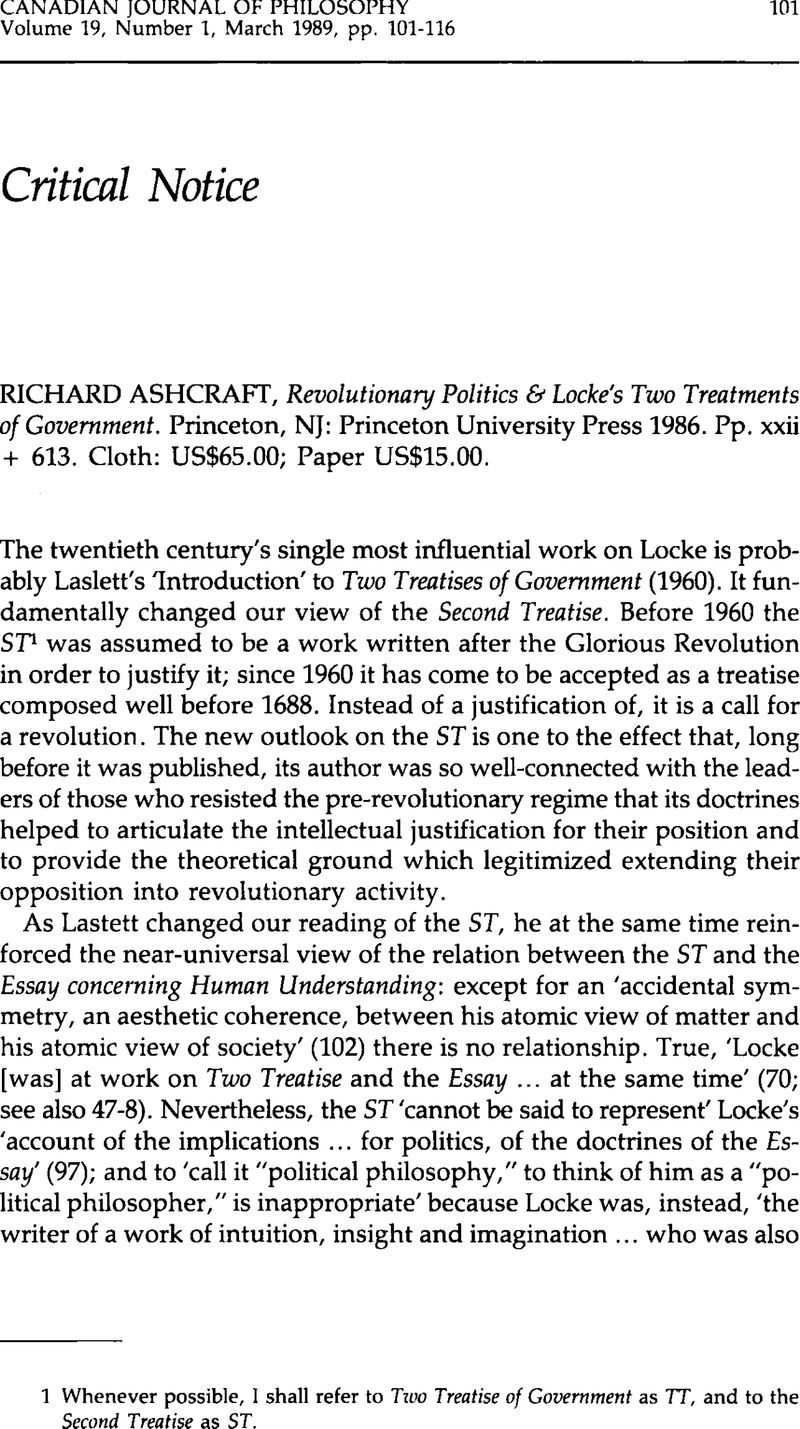Published online by Cambridge University Press: 01 January 2020

1 Whenever possible, I shall refer to Two Treatise of Government as TT, and to the Second Treatise as ST.
2 Julian H. Franklin, John Locke and the Theory of Sovereignty (New York: Cambridge University Press 1978) 98ff.
3 Mark Goldie, (i) ‘The Roots of True Whiggism 1688-94,’ History of Political Thought 1 (1980) 195-236, esp. 195, 220; and (ii) ‘The Revolution of 1689 and the Structure of Political Argument,’ Bulletin of Research in the Humanities 83 (1980) 473-564, esp. 517-19
4 Goldie, ii, 519
5 Its correctness is confirmed by the contents of a manuscript recently rediscovered and published for the first time by James Farr and Calyton Roberts, ‘John Locke on the Glorious Revolution: A Rediscovered Document,’ The Historical Journal 28 (1985) 385-98.
6 It also calls for critique of Farr and Roberts. When Locke calls William ‘our Great Restorer’ Farr and Roberts take this accolade at its face value ‘because his rule respects and rests upon the laws and liberties of Englishmen’ (394). It will be clear in a moment why I believe they are closer to the mark when they write that ‘Locke was far more intent on justifying the principles of the Revolution as conceived in his own political theory than in assisting William III’ (Ibid., 390).
7 John Dunn, ‘Revolution,’ forthcoming in Terence Ball, James Farr, Russell Hanson, eds., Political lnnovation and Conceptual Change, in the series Ideas in Context (Cambridge: Cambridge University Press), general editors Quentin Skinner and Richard Rorty.
8 See, for examples, Crane Brinton, Anatomy of Revolution (New York: W.W. Norton 1953), the opening pages and 277ff; Hannah Arendt, On Revolution (New York: Viking Press 1963), 40; Carl J. Friedrich, ed., Revolution (New York: Atherton Press 1966), 4; J.H. Elliot, ‘Revolution and Continuity in Early Modern Europe,’ Past and Present 42 (1969) 35-56, esp. 40 and 43.
9 The quoted phrase is Dunn's (‘Revolution’) who nevertheless holds that it would be wise to bear in mind that ‘long-term consequences’ and the ‘collapse of an absolutist political order of some longevity in the face of the angry political energy of its subjects’ are characteristics of both the French and Russian upheavals-events whose revolutionary nature no one denies. If these are two elements of revolution, their characteristics are found as well in revolutionary activity. Spelling this out shows the partial overlap of Dunn's statements with my working definition: the anger of the subject is aroused by the lack of freedom experienced under an absolutist political order; the anger is channelled into activity directed to erasing that order; such activity is resisted by that order which, since it has determined its own existence as absolutely legal, must brand such activity as illegal.
10 Of course Ashcraft is not alone in ascribing revolutionary import to Locke's position. ‘In the world of thought,’ writes George Pattee, ‘the French Revolution’ ‘put forth doctrines that echoed Locke’ (‘Revolution — Typology and Process,’ in Carl J. Friedrich, Revolution 10-33; 12). Farr and Roberts stress the revolutionary aspect of Locke's post-Second Treatise manifesto on pp. 391-3 (The Historical Journal 28 [1985]). Mark Goldie connects ‘Locke's account of natural rights and the right of revolution’ in ‘The Roots of True Whiggism 1688-94,’ 210. Although Pattee, Farr and Roberts, and Goldie ascribe revolutionary doctrines to Locke, none of them provides a sufficient theoretical justification for this ascription. Hence my theoretical support for Ashcraft's calling Locke a revolutionary (provided in my next section) gives justification for more than his characterization of Locke.
11 Quoted by Richard Aaron in john Locke, 3rd ed. (New York: Oxford University Press 1971) 9
12 John Locke, Works, 1823, 1963 reprint by Scientia Verlag (Aalen), Vol. IV, 48
13 For example, J. R. Milton, ‘Before the Drafts: Locke's Intellectual Development 1658-1671,’ a paper read to the British Society for the History of Philosophy Conference on John Locke (Oxford, November 15, 1986).
14 This is the central argument of The Imposition of Method, A Study of Descartes and Locke (New York: Oxford University Press 1980).